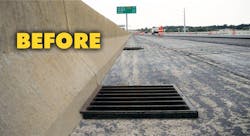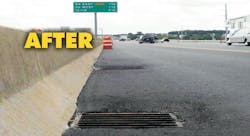by Angus W. Stocking, L.S.
Asphalt overlays are usually routine exercises. They’re important, sure, and hard to do well, but the contractors, owners, and designers of these projects tend to be very experienced and the technical challenges are well understood. Put another way, there aren’t too many surprises on an overlay project, and new solutions are rarely needed.
But that’s just what happened this past summer when a large overlay project was accomplished on Wisconsin’s I-39 highway. In the section being resurfaced, about a hundred catch basins lay atypically close to a concrete barrier wall. “In places, the barrier wall was actually over the basins,” explains Project Manager Curt Neuhauser of the Wisconsin Department of Transportation (WISDOT). “This initially seemed like it might cause a lot of unexpected work and expense. Fortunately, the contractor floated an option that sounded like it would work.”
To stay level with the new asphalt overlay, all the catch basins needed to be raised a few inches. Otherwise, the low inlets would create dangerous potholes and the new asphalt would degrade sooner. In the project specifications, this lift was to be accomplished by conventional means—chip out the basin frames, and add or replace concrete risers as needed to raise the level of the surface inlet. This could usually be done fairly easily, but with the barrier wall so close, and so big—about three feet high and 18 inches wide—chipping out the surrounding roadway would likely require temporary removal of the wall… which would certainly require more labor and might also require additional lane closures.
But as Neuhauser suggests, the contractor had a better plan. In similar situations, Catch Basin Risers from American Highway Products had been used to raise inlets without removing any surrounding asphalt. “I’ve used them before, and have found them quick and easy to install,” says Payne & Dolan Project Manager Sam Bilhorn. “I felt they could be used here, and we could avoid removing or undermining the wall. And it wasn’t even a change order—the point was, we were able to avoid a change order. And WISDOT agreed they were worth a try.”
AHP’s Catch Basin Risers are precisely sized as needed for given situations; width, depth, and height are customized for particular jobs. American Highway Products will even provide multiple sizes per order, and keep them organized by size when shipping. This makes the risers easy to install prior to paving—inlet grates are removed, the original utility frames are cleaned, and the steel risers are slipped into the frame. They fit snugly enough to stay in place before repaving, and are locked in and supported by the new asphalt layer. The old grates are placed back in the new risers, and the riser/grate unit is sturdy enough to support heavy truck traffic during construction. And when the asphalt lift is complete, there is no cracking or dishing around the inlet, and no need for any new or old roadway to be dug out. This greatly improves roadway endurance near utilities.
And installation is also fast; “Really, they take about five minutes to place,” Bilhorn says. “Sometimes, due to variations in the original inlets, a little field fitting is required, but even that was unusual. We used about a hundred on the I-39 project, and had no problems at all.”
For his part, Neuhauser is optimistic, and the risers will be used on upcoming projects. “All we had to do was remove the grate and install the risers,” he says. “We didn’t have to remove the barrier wall, and we didn’t even have to dig out any roadway. The proof is in the pudding, of course, but we like how they worked on this project, and we’ll be using them again.”

